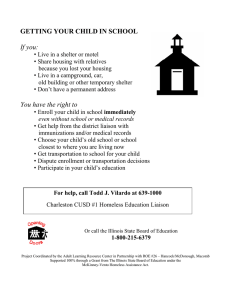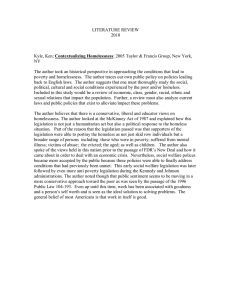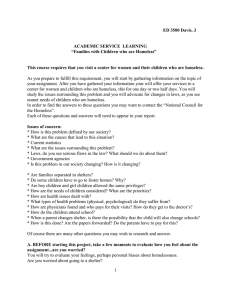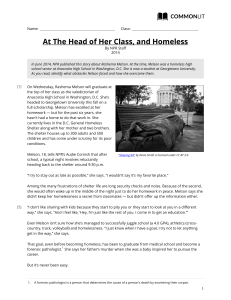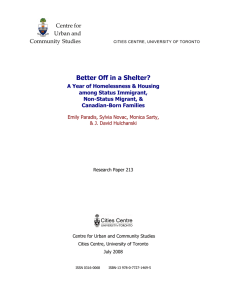Crisis Support to Long-term Solutions
advertisement
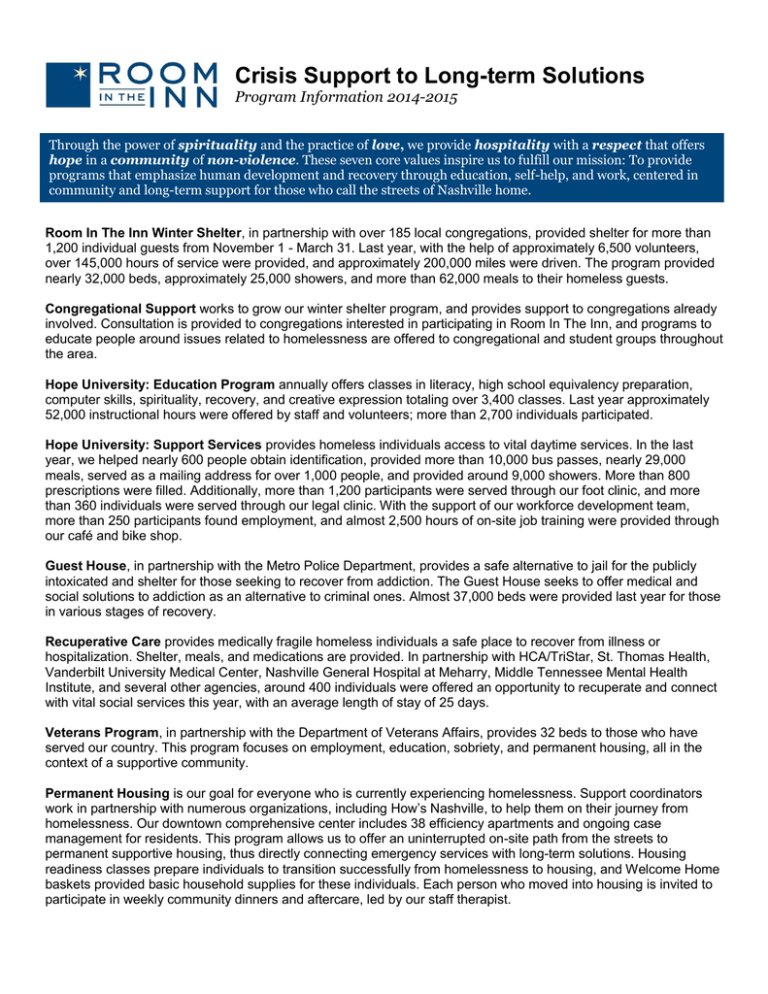
Crisis Support to Long-term Solutions Program Information 2014-2015 Through the power of spirituality and the practice of love, we provide hospitality with a respect that offers hope in a community of non-violence. These seven core values inspire us to fulfill our mission: To provide programs that emphasize human development and recovery through education, self-help, and work, centered in community and long-term support for those who call the streets of Nashville home. Room In The Inn Winter Shelter, in partnership with over 185 local congregations, provided shelter for more than 1,200 individual guests from November 1 - March 31. Last year, with the help of approximately 6,500 volunteers, over 145,000 hours of service were provided, and approximately 200,000 miles were driven. The program provided nearly 32,000 beds, approximately 25,000 showers, and more than 62,000 meals to their homeless guests. Congregational Support works to grow our winter shelter program, and provides support to congregations already involved. Consultation is provided to congregations interested in participating in Room In The Inn, and programs to educate people around issues related to homelessness are offered to congregational and student groups throughout the area. Hope University: Education Program annually offers classes in literacy, high school equivalency preparation, computer skills, spirituality, recovery, and creative expression totaling over 3,400 classes. Last year approximately 52,000 instructional hours were offered by staff and volunteers; more than 2,700 individuals participated. Hope University: Support Services provides homeless individuals access to vital daytime services. In the last year, we helped nearly 600 people obtain identification, provided more than 10,000 bus passes, nearly 29,000 meals, served as a mailing address for over 1,000 people, and provided around 9,000 showers. More than 800 prescriptions were filled. Additionally, more than 1,200 participants were served through our foot clinic, and more than 360 individuals were served through our legal clinic. With the support of our workforce development team, more than 250 participants found employment, and almost 2,500 hours of on-site job training were provided through our café and bike shop. Guest House, in partnership with the Metro Police Department, provides a safe alternative to jail for the publicly intoxicated and shelter for those seeking to recover from addiction. The Guest House seeks to offer medical and social solutions to addiction as an alternative to criminal ones. Almost 37,000 beds were provided last year for those in various stages of recovery. Recuperative Care provides medically fragile homeless individuals a safe place to recover from illness or hospitalization. Shelter, meals, and medications are provided. In partnership with HCA/TriStar, St. Thomas Health, Vanderbilt University Medical Center, Nashville General Hospital at Meharry, Middle Tennessee Mental Health Institute, and several other agencies, around 400 individuals were offered an opportunity to recuperate and connect with vital social services this year, with an average length of stay of 25 days. Veterans Program, in partnership with the Department of Veterans Affairs, provides 32 beds to those who have served our country. This program focuses on employment, education, sobriety, and permanent housing, all in the context of a supportive community. Permanent Housing is our goal for everyone who is currently experiencing homelessness. Support coordinators work in partnership with numerous organizations, including How’s Nashville, to help them on their journey from homelessness. Our downtown comprehensive center includes 38 efficiency apartments and ongoing case management for residents. This program allows us to offer an uninterrupted on-site path from the streets to permanent supportive housing, thus directly connecting emergency services with long-term solutions. Housing readiness classes prepare individuals to transition successfully from homelessness to housing, and Welcome Home baskets provided basic household supplies for these individuals. Each person who moved into housing is invited to participate in weekly community dinners and aftercare, led by our staff therapist.

